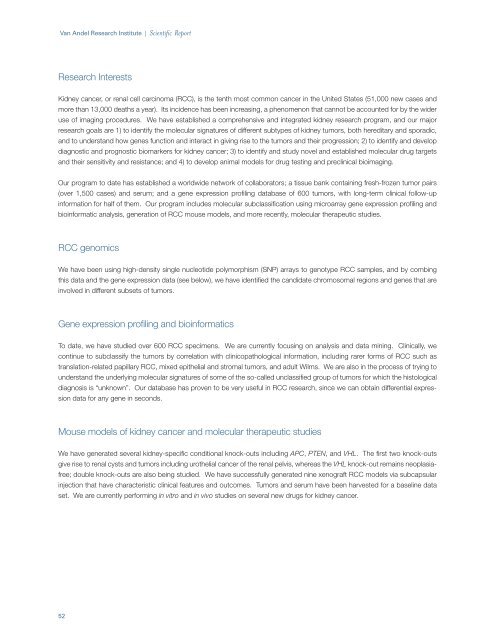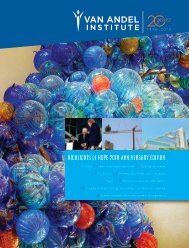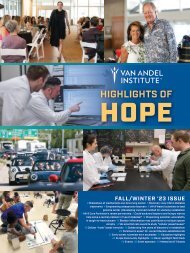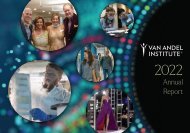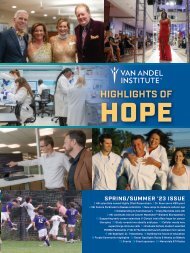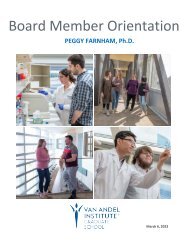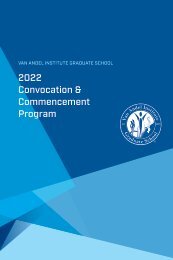2008 Scientific Report
You also want an ePaper? Increase the reach of your titles
YUMPU automatically turns print PDFs into web optimized ePapers that Google loves.
Van Andel Research Institute | <strong>Scientific</strong> <strong>Report</strong><br />
Research Interests<br />
Kidney cancer, or renal cell carcinoma (RCC), is the tenth most common cancer in the United States (51,000 new cases and<br />
more than 13,000 deaths a year). Its incidence has been increasing, a phenomenon that cannot be accounted for by the wider<br />
use of imaging procedures. We have established a comprehensive and integrated kidney research program, and our major<br />
research goals are 1) to identify the molecular signatures of different subtypes of kidney tumors, both hereditary and sporadic,<br />
and to understand how genes function and interact in giving rise to the tumors and their progression; 2) to identify and develop<br />
diagnostic and prognostic biomarkers for kidney cancer; 3) to identify and study novel and established molecular drug targets<br />
and their sensitivity and resistance; and 4) to develop animal models for drug testing and preclinical bioimaging.<br />
Our program to date has established a worldwide network of collaborators; a tissue bank containing fresh-frozen tumor pairs<br />
(over 1,500 cases) and serum; and a gene expression profiling database of 600 tumors, with long-term clinical follow-up<br />
information for half of them. Our program includes molecular subclassification using microarray gene expression profiling and<br />
bioinformatic analysis, generation of RCC mouse models, and more recently, molecular therapeutic studies.<br />
RCC genomics<br />
We have been using high-density single nucleotide polymorphism (SNP) arrays to genotype RCC samples, and by combing<br />
this data and the gene expression data (see below), we have identified the candidate chromosomal regions and genes that are<br />
involved in different subsets of tumors.<br />
Gene expression profiling and bioinformatics<br />
To date, we have studied over 600 RCC specimens. We are currently focusing on analysis and data mining. Clinically, we<br />
continue to subclassify the tumors by correlation with clinicopathological information, including rarer forms of RCC such as<br />
translation-related papillary RCC, mixed epithelial and stromal tumors, and adult Wilms. We are also in the process of trying to<br />
understand the underlying molecular signatures of some of the so-called unclassified group of tumors for which the histological<br />
diagnosis is “unknown”. Our database has proven to be very useful in RCC research, since we can obtain differential expression<br />
data for any gene in seconds.<br />
Mouse models of kidney cancer and molecular therapeutic studies<br />
We have generated several kidney-specific conditional knock-outs including APC, PTEN, and VHL. The first two knock-outs<br />
give rise to renal cysts and tumors including urothelial cancer of the renal pelvis, whereas the VHL knock-out remains neoplasiafree;<br />
double knock-outs are also being studied. We have successfully generated nine xenograft RCC models via subcapsular<br />
injection that have characteristic clinical features and outcomes. Tumors and serum have been harvested for a baseline data<br />
set. We are currently performing in vitro and in vivo studies on several new drugs for kidney cancer.<br />
52


